If your lip skin peeling, gently exfoliate and moisturize regularly. Avoid licking your lips and use a lip balm with SPF protection.
Dealing with peeling lip skin can be both uncomfortable and unsightly. This common issue may arise due to various factors including dry weather, sunburn, or dehydration. To tackle this problem, it’s essential to incorporate a simple yet effective lip care routine.
Start by softly exfoliating your lips to remove dead skin cells; this can be done with a homemade sugar scrub or a soft toothbrush. After exfoliating, it’s crucial to keep the lips hydrated. Applying a nourishing lip balm frequently throughout the day can provide relief and hydration. Choosing lip balms that contain nourishing ingredients like beeswax, shea butter, or vitamin E is ideal.
Remember, prevention is key, so protecting your lips from harsh environmental conditions by using a lip balm with sun protection factor (SPF) can help prevent peeling in the first place. Consistent care, alongside these proactive steps, will promote lip health and prevent future peeling.
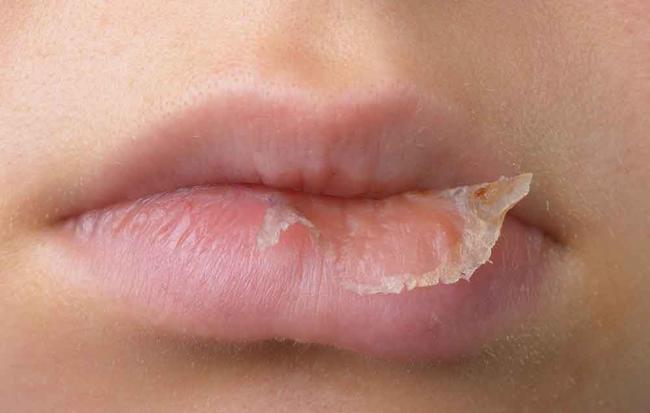
Credit: www.seasidemedicaltech.com
Overview Of Lip Skin Peeling
Lip skin peeling can be a frustrating condition. It often involves uncomfortable, flaky, and sometimes painful lips. As the weather changes or stress takes its toll, the delicate skin of the lips can suffer severely. Understanding why lip skin peels and how to deal with it is key to maintaining the health and beauty of your lips.
Causes Of Peeling Lips
The causes of peeling lips are varied. They range from environmental factors to personal habits. Let’s take a closer look at a few common culprits:
- Weather conditions: Extreme cold or hot weather can dry out lips.
- Dehydration: Not drinking enough water can lead to dry skin.
- Bad habits: Biting or licking lips can worsen peeling.
- Allergic reactions: Some cosmetics or toothpaste can irritate lips.
- Health issues: Certain vitamin deficiencies or illnesses may cause peeling.
Why Lip Care Is Essential
Lip care should be part of every person’s daily routine. The lips have thin skin and lack oil glands, making them vulnerable to damage. Dry, chapped, or peeling lips can lead to discomfort and even infections. Regular lip care promotes healing, prevents damage, and keeps your lips looking plush and healthy.
- Apply a nourishing lip balm regularly.
- Stay hydrated by drinking water throughout the day.
- Protect your lips with an SPF balm in sunny conditions.
- Avoid licking or picking at your lips.
- Choose lip products carefully to prevent allergic reactions.
Early Symptoms To Recognize
Noticing chapped lips early can save discomfort and worry. Know the initial signs and when to get advice from a professional.
Initial Signs
Your lips speak volumes about your health. Stay alert for these early warnings:
- Dryness – The first hint something’s off.
- Tightness – Your lips may feel stretched or stiff.
- Flaking – Small, thin pieces of skin may start to come off.
- Fine lines – Look for unusual wrinkles on the lip surface.
- Redness or inflammation – Indicates irritation or damage.
When To Seek Professional Advice
Don’t wait if symptoms persist. Seek medical advice when:
| Cracking | Lips crack open, even bleed. |
| Persistent dryness | No relief from balms or treatments. |
| Swelling | Lips puff up abnormally. |
| Pain | Soreness or burning doesn’t fade. |
| Discoloration | Changes in lip color without clear cause. |
Home Remedies For Relief
Chapped lips can feel unbearable, but don’t worry! Home remedies are here to soothe and restore. Simple, natural solutions often provide the best relief. Let’s explore them!
Natural Oils And Hydration
Healthy lips need moisture and care. The right oils can make a difference. Look at these nourishing options:
- Coconut Oil: It’s hydrating and antibacterial. Apply it before bed.
- Almond Oil: Rich in vitamins, it helps repair the skin barrier. Dab on a few drops throughout the day.
- Olive Oil: A natural moisturizer that soothes dry lips with ease.
Remember to drink plenty of water! Staying hydrated is essential for soft lips. Aim for eight glasses a day.
Diy Sugar Scrubs
Exfoliation can gently remove flaky skin. Here’s a simple sugar scrub to try:
- Mix 2 teaspoons of sugar with 1 teaspoon of honey.
- Add a drop of your favorite essential oil for extra benefits.
- Gently scrub the mixture on your lips for a minute.
- Rinse with warm water and apply a nourishing balm afterward.
Use this scrub once a week to maintain soft, smooth lips.
Hydration And Nutrition
Lip skin peeling can be annoying. It’s a sign your lips need more care. They may lack hydration and nutrition. This part of the skin is thin. It loses moisture fast. Here’s how to keep your lips soft and healthy.
Importance Of Water Intake
Drinking water is key for healthy skin. Your lips benefit a lot from it. Water helps cells work well. It keeps lips from drying and flaking. Aim to drink eight glasses per day. This will keep your body and lips well-hydrated.
Vitamins And Foods For Healthy Lips
Nutrition matters for lips, too. Some vitamins help more than others. Vitamins A, C, E, and B vitamins are great for your lips.
- Vitamin A – found in carrots and sweet potatoes.
- Vitamin C – in oranges and strawberries.
- Vitamin E – in nuts and seeds.
- B Vitamins – in chicken, fish, and avocados.
Omega-3 fatty acids also help. They keep the skin, including lips, supple. Find these in fish, flaxseeds, and walnuts. Don’t forget to eat a balanced diet. Your lips will thank you.
Commercial Products For Treatment
Peeling lip skin can feel uncomfortable and sometimes even painful. Commercial products for treatment offer a range of solutions. Here’s how to choose the right lip care to restore your smile.
Choosing The Right Lip Balm
Your lips deserve the best. A good lip balm can help heal peeling skin. Look for these features:
- Natural moisturizers like beeswax or shea butter.
- SPF protection to shield your lips from the sun.
- Vitamins and antioxidants, such as vitamin E.
Consider trying balms that are petroleum-free for a more natural approach.
Avoiding Harmful Chemicals
Some lip products contain chemicals that can do more harm than good. Stay clear of:
| Chemical | Found In |
|---|---|
| Parabens | Some lip care items |
| Phthalates | Certain fragranced products |
| Salicylic Acid | Exfoliating balms |
Choose products labeled as “free-from” these harsh ingredients. Your lips will thank you for it.
Protecting Lips From Environmental Factors
Protecting lips from environmental factors is key to preventing peeling skin. Lips don’t have oil glands like other parts of the skin. This means they are more prone to drying out. The elements can be harsh on your delicate lip skin. Understanding how to shield your lips can keep them smooth and healthy.
Sun Protection For Lips
Just like the rest of your skin, your lips are susceptible to sun damage. Use a lip balm with SPF to protect them. It creates a barrier between your skin and harmful UV rays. Remember to reapply the balm every two hours, especially after eating or swimming.
- Choose a lip balm with at least SPF 15.
- Look for ingredients like zinc oxide or titanium dioxide.
- Wear a wide-brimmed hat for extra protection.
Dealing With Cold And Wind
When temperatures drop, lips often suffer. The cold and wind strip moisture away. Keep lips covered with a scarf when outside. Stay hydrated by drinking plenty of water.
- Apply a thick, emollient lip balm frequently.
- Choose products with natural moisturizing agents like shea butter or beeswax.
- Avoid licking your lips. This can make dryness worse.
When To Consult A Dermatologist
Peeling lips can be a minor annoyance, but sometimes they need a doctor’s care. Dry, chapped, and peeling lips are common in cold and windy conditions. Bad habits, like licking your lips, make it worse. Often, home remedies help. Yet there are times when seeing a skin expert is the best answer. How do you know when it’s time to book an appointment? Let’s explore the signs that it’s time to see a dermatologist.
Persistent Symptoms
If your lip peeling lasts more than a few weeks, it’s time to call a doctor. Keep an eye out for these signs:
- Patches that won’t heal
- Pain or bleeding
- Sudden swelling
- Itching that won’t stop
- Lips feeling tight
Bold lip care is good, but an expert’s look can help you find a fix fast. Persistent symptoms can signal more than dry air.
Professional Treatments
Your dermatologist has treatments that aren’t on store shelves. These might be:
- Medicated creams
- Lip scrubs
- Hydrating masks
- Prescription-strength balms
These treatments target the root cause of peeling. They are strong and effective. A visit to the dermatologist ensures you get the right one. Leave the guesswork out, get the care you need.
Preventive Measures And Daily Care
Chapped lips can be more than a minor inconvenience; they can lead to peeling skin. To maintain soft, healthy lips, a proactive approach with daily care and lifestyle adjustments is essential.
Daily Lip Care Routine
Consistent lip care helps prevent peeling. Start with these simple steps:
- Hydrate: Drink plenty of water to keep your lips and body well-hydrated.
- Gentle Cleansing: Clean your lips with a mild cleanser, avoiding harsh ingredients.
- Moisturize: Apply a hydrating lip balm with SPF throughout the day.
- Exfoliate: Use a lip scrub weekly to remove dead skin gently.
Long-term Lifestyle Changes
Consider these lifestyle changes for lip health:
| Lifestyle Area | Changes for Lip Health |
|---|---|
| Diet | Include foods rich in vitamins and omegas. |
| Smoking | Quit smoking to improve overall lip condition. |
| Rest: | Get enough sleep to support skin regeneration. |
| Environment: | Protect your lips from extreme temperatures and wind. |
Avoid licking your lips as saliva can dry them out. Consider using a humidifier to keep air moist in dry environments.
Conclusion: Maintaining Lip Health
Maintaining healthy lips involves regular care and attention to prevent peeling. In this blog post, we’ve explored strategies to combat lip peeling.
Summary Of Key Points
Here’s a brief recap of what we’ve covered:
- Stay hydrated: Drink plenty of water.
- Use a humidifier: Keep your indoor air moist.
- Lip balms and creams: Use those with natural oils.
- Protect your lips: Shield them from harsh weather.
- Avoid harsh products: Skip lip products with irritants.
- Balanced diet: Eat foods rich in vitamins and minerals.
Encouragement To Prioritize Lip Care
Your lips deserve attention just as much as any other part of your body. Make lip care a routine to keep them smooth and healthy. Challenge yourself to follow these tips and notice the difference in your lip health. Remember, self-care is a priority, and that includes taking care of your lips!
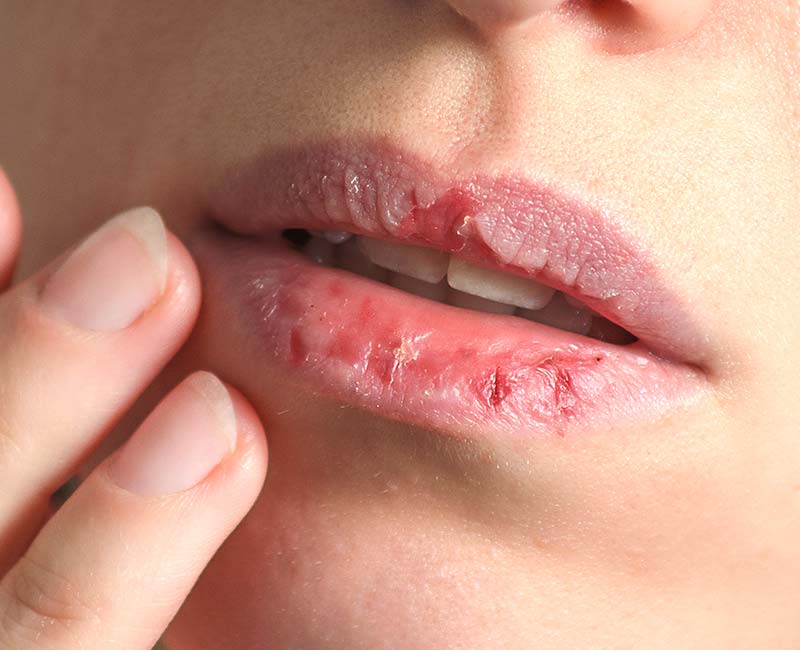
Credit: my.clevelandclinic.org
Frequently Asked Questions For What To Do When Your Lip Skin Peel
Why Is My Lips Peeling?
Lips may peel due to dehydration, harsh weather conditions, or allergic reactions. Lip balms and staying hydrated can help prevent peeling.
Is It Normal To Pick At Your Lips?
Picking at your lips is common, especially when they are dry or chapped. It’s important not to overdo it, as this can lead to irritation or even infection. Moisturizing regularly can help prevent the urge to pick.
How Do You Heal A Split Lip?
To heal a split lip, keep it clean and apply a cold compress. Use an antibiotic ointment and a lip balm. Avoid licking the lips, and stay hydrated. If needed, consult a doctor.
Does Vaseline Help Dry Lips?
Yes, Vaseline can help soothe and moisturize dry lips. Its protective barrier locks in moisture, aiding in healing.
Conclusion
Peeling lips can be uncomfortable and concerning, but solutions are within reach. Stay hydrated, use gentle lip care, and avoid harsh conditions. Remember, consistent care is key. Seek a dermatologist if issues persist or worsen. Your lips deserve attention; nurture them back to health for a confident, beautiful smile.
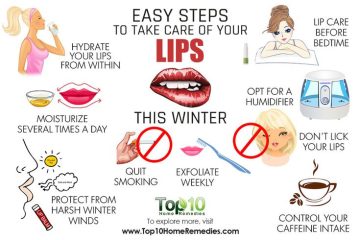
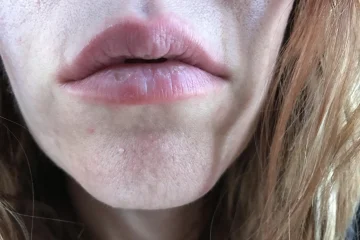
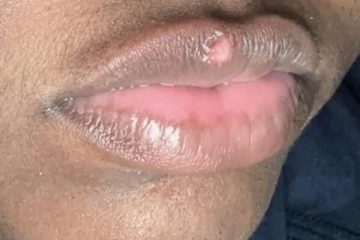
0 Comments